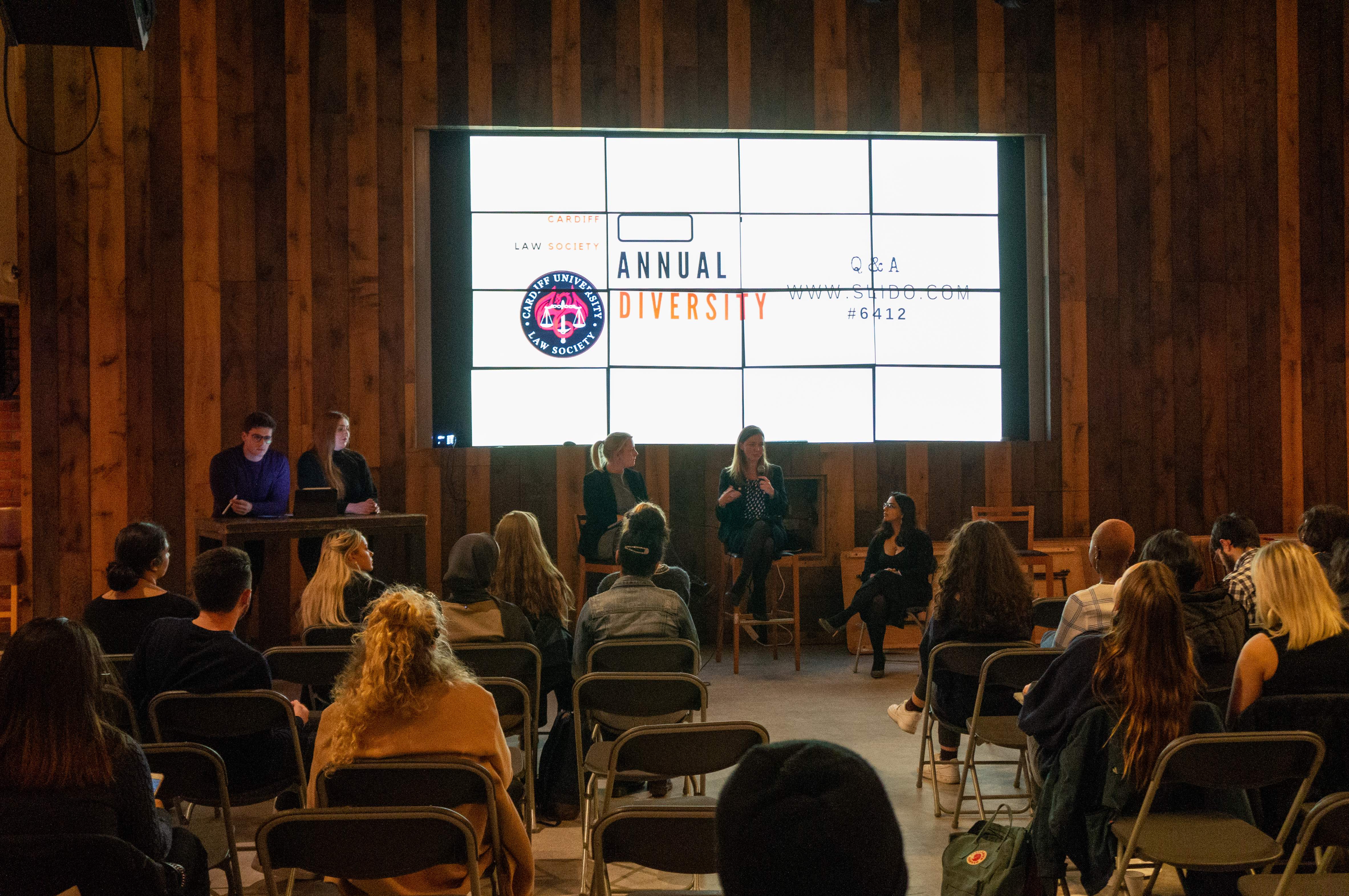Photography and words by Luisa De la Concha Montes
On Tuesday the 26th of November, Cardiff UniversityÔÇÖs Law Society held their first ever Diversity Event. The purpose of this panel of discussion was to allow speakers to talk about their experiences as LGBTQ+, BAME, and Women individuals; and through this, raise awareness on the issues that specific social groups face in the workplace. According to the societyÔÇÖs Wellbeing and Diversity Officer, Janaki Selvaratnam, the Law Society Committee decided to organise this event to strive to make the members of their society, and the University as a whole more progressive. By implementing a more diverse and inclusive agenda, they want to ÔÇ£ensure that everyone feels like they belong, no matter what background they are from.ÔÇØ Even though the event was organised by the Law Society, the experiences and anecdotes that were shared were not only useful to law students, or people in the law industry; they shed light into circumstances that everyone in the audience could relate to.
The first panel tackled LGBTQ+ issues and concerns, the speakers were Eleanor Jarvis from Eversheds Sutherland, George Oakes from Osborne Clarke, and Zachary Edge, who is the StudentÔÇÖs Union LGBTQ+ Officer. All of them highlighted the importance of implementing and developing inclusive workplaces, and they mentioned specific examples of how the companies they work for have been doing this. George Oakes explained how Osbourne Clarke has developed an LGBTQ+ Pride network, which allows members to join anonymously. By hosting events that aim to create awareness, and making sure that members are not forced to disclose their sexual orientation, employees can be part of the companyÔÇÖs internal LGBTQ+ community without having to disclose whether they belong to the community, of if they are taking part of it as allies. Eleanor Jarvis also explained how Eversheds SutherlandÔÇÖs application process aims to tackle diversity by making it open to people from all backgrounds; and Zachary Edge highlighted the Student UnionÔÇÖs main accomplishments in relation to the LGBTQ+ agenda in the previous years, such as the implementation of gender-neutral bathrooms and the setting up of LGBTQ+ first year accommodation. The speakers also emphasised that university environments tend to be extremely inclusive, and they are a place where students can really embrace who they are; however, this inclusivity doesnÔÇÖt always translate to the workplace, which can be a difficult transition for LGBTQ+ community members. They strongly emphasised that this is why the end goal of companies should be to have equal treatment regardless of peopleÔÇÖs background.

The second panel consisted of three BAME (Black Asian and Minority Ethnic) speakers: Roshni Patel from Eversheds Sutherland, Vishesh Mhatre from Womble Bond Dickinson and Sean Wharton from the charity ÔÇ£Show Racism the Red CardÔÇØ. Vishesh Mhatre focused on his own experience as an international student, and expressed how the job application process can be a lot more daunting for international students, as they donÔÇÖt only have to deal with a great amount of job rejections, but their application process is only limited to companies that sponsor Tier 2 visas (even if they studied in the UK). He also brought awareness to the fact that racism can occur on a micro-level, such as passing comments. As an example of this, he said that when he joined societies in his first year at University, everyone assumed that he had come to audition for the Bollywood Society, when in reality, he just wanted to join the Music Society.
The speakers also highlighted that there is an evident lack of representation of BAME employees in the law industry, specifically for Black and African Caribbean people, which is why they really foster the idea of law firms pushing a more diverse agenda. Sean mentioned that in the past, the companyÔÇÖs motive for implementing a diverse agenda was just to meet the quotas set by the industry. However, nowadays firms have actually started to see it as a competitive advantage, and they understand that employing people from diverse backgrounds can be extremely beneficial. In relation to this, he said that a lot of people are afraid to apply to certain firms because they come from a minority background, and they feel that this will put them on disadvantage compared to their peers. However, Sean said, it is extremely important to embrace your cultural identity and use ÔÇ£what makes you different to your advantage.ÔÇØ Ultimately, he emphasised, since racism is still a defining factor in our society, individuals that come from a minority background need to guide those around them, and show them how they can stop defining people in terms of race: ÔÇ£I donÔÇÖt want to be black. I want to be Sean.ÔÇØ The speakersÔÇÖ personal approach during this panel allowed the audience to really understand the constraints and limitations that minorities still face on a daily basis. However, the stance they took on the issue wasnÔÇÖt negative at all, all the opposite, they emphasised how coming from a varied cultural background was a great benefit for them ÔÇônot only when shaping their career path, but also personally, as it allowed them to understand the world, and the law industry from a different point of view.

The third and final panel consisted of three women speakers: Julia Davies from Burges Salmon, Trish DÔÇÖSouza from Capital Law, and Niahm Connan from Enterprise Rent-A-Car. All the speakers had an extremely honest approach to the topic, as they acknowledged right away that there is no gender parity in law industries, and even though some companies are making all they can to make the industry equal, there are circumstantial issues that make womenÔÇÖs experience in the industry completely different to menÔÇÖs, such as motherhood. Regarding this, Julia emphasised how Burges SalmonÔÇÖs offices have now become ÔÇ£breastfeeding friendlyÔÇØ, which means that women can bring their children to work, and they can have the comfort of knowing that they can feed their babies there; additionally, the implementation of parent coaching has allowed both, men and women, to take time off work after having a child, which means that the whole weight of raising a child doesnÔÇÖt have to fall solely on the woman. Moreover, various companies have also started thinking of ways in which workplaces can adapt to the needs that women have during menopause. Some of the proposed initiatives include the implementation of separate rooms where women can go to relax when theyÔÇÖre not feeling too well. The bottom line of this initiatives, Julia argued, is that companies need to start acknowledging that women have different needs and experiences than men, so in order for them to achieve an equal standpoint, companies need to adapt their policies to individual needs.
The speakers also talked about the subconscious biases that women sometimes fall into, such as being too scared for asking for a promotion, or even asking for a day off. The speakers urged females in the audience to avoid this type of behaviour, and allow themselves to open up about their needs. That way, they argued, companies wonÔÇÖt fall into the biases either, and as a consequence, they will be more inclusive and sympathetic to women. As an example of this, Julia described how she pushed her University to allow her to have her six-month-old baby with her when she presented her exams. As a result, they hired a moderator that would stop taking time when her baby started crying. Finally, they also emphasised the importance of hosting events like this, as they not only help excluded groups come together, but they also help those outside of these communities ÔÇôspecifically white, male audiences to gain more awareness, and improve their approach.

Overall, the event was an eye-opening experience as it allowed the audience to understand how work experiences do differ depending on the individualÔÇÖs cultural background and identity. Each panel was a clear reminder that even though massive improvements have been done in more recent years regarding inclusivity, there is still a lot that can and needs to be done. It was an extremely helpful event for students too, as most employability workshops and lectures tend to emphasise the good side of employment, without delving into the complexities of what employees experience on a daily basis. The Law SocietyÔÇÖs President, Bella Gropper, closed the evening on a hopeful note, saying that this will be just the first of many more diversity events to come in the future.

